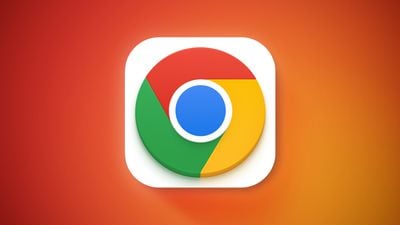U.S. DoJ Wants Google to Sell Chrome Browser
The United States Department of Justice wants Google to sell off its Chrome browser as part of an ongoing antitrust lawsuit, reports Bloomberg. Earlier this year, Google was found to have a search monopoly, and antitrust regulators have since been deciding on the actions that should be taken to address Google's anticompetitive practices.

The DoJ plans to ask the court to force Google to sell Chrome, which is the most popular web browser in the world by a wide margin. Chrome's integration with Google Search and other Google products has been cited as one of the factors limiting search competition.
Regulators also want Google to uncouple the Android operating system from other products like Google Search and the Google Play Store, both of which are apps installed on Android devices by default. It's not clear how unbundling Android from Google Play would work as Google Play is the Android app store. The DoJ initially wanted Google to sell off Android entirely, but has since backed off of that suggestion.
The DoJ will recommend that Google be required to license data and syndicate results from Google Search without restrictions. Bloomberg suggests that syndication would allow rival search engines and AI startups to improve their quality, while the data feed would let others build their own search indexes. Google could also be required to share more data with advertisers, with advertisers given more control over where their ads appear.
Google will be prevented from entering into exclusive deals such as the deal that it has with Apple to make Google the default Safari search engine. Google paid Apple $20 billion in 2022 to be the Safari default.
Google is appealing the antitrust ruling, while the judge overseeing the case plans to hold a two-week hearing in April 2025 to go over what changes Google has to make to address anticompetitive search behavior. From there, a final ruling is set to be issued in August 2025.
Popular Stories
Since the iPhone X in 2017, all of Apple's highest-end iPhone models have featured either stainless steel or titanium frames, but it has now been rumored that this design decision will be coming to an end with the iPhone 17 Pro models later this year.
In a post on Chinese social media platform Weibo today, the account Instant Digital said that the iPhone 17 Pro models will have an aluminum...
Apple is continuing to refine and update iOS 26, and beta three features smaller changes than we saw in beta 2, plus further tweaks to the Liquid Glass design. Apple is gearing up for the next phase of beta testing, and the company has promised that a public beta is set to come out in July.
Transparency
In some apps like Apple Music, Podcasts, and the App Store, Apple has toned down the...
In select U.S. states, residents can add their driver's license or state ID to the Wallet app on the iPhone and Apple Watch, providing a convenient and contactless way to display proof of identity or age at select airports and businesses, and in select apps.
Unfortunately, this feature continues to roll out very slowly since it was announced in 2021, with only nine U.S. states, Puerto Rico,...
Apple will launch its new iPhone 17 series in two months, and the iPhone 17 Pro models are expected to get a new design for the rear casing and the camera area. But more significant changes to the lineup are not expected until next year, when the iPhone 18 models arrive.
If you're thinking of trading in your iPhone for this year's latest, consider the following features rumored to be coming...
Apple is expanding the ability to add an Apple Account Card to the Wallet app to more countries, according to backend Apple Pay changes.
With iOS 15.5, Apple updated the Wallet app to allow users to add an Apple Account Card, which displays the Apple credit balance associated with an Apple ID.
If you receive an Apple gift card, for example, it is added to an Apple Account that is also...
Three out of four iPhone 17 models will feature more RAM than the equivalent iPhone 16 models, according to a new leak that aligns with previous rumors.
The all-new iPhone 17 Air, the iPhone 17 Pro, and the iPhone 17 Pro Max will each be equipped with 12GB of RAM, according to Fixed Focus Digital, an account with more than two million followers on Chinese social media platform Weibo. The...
Apple should unveil the iPhone 17 series in September, and there might be one bigger difference between the Pro and Pro Max models this year.
As always, the Pro Max model will be larger than the Pro model:iPhone 17 Pro: 6.3-inch display
iPhone 17 Pro Max: 6.9-inch displayGiven the Pro Max is physically larger than the Pro, it has more internal space, allowing for a larger battery and...
The calendar has turned to July, meaning that 2025 is now more than half over. And while the summer months are often quiet for Apple, the company still has more than a dozen products coming later this year, according to rumors.
Below, we have outlined at least 15 new Apple products that are expected to launch later this year, along with key rumored features for each.
iPhone 17 Series
iPho...




















